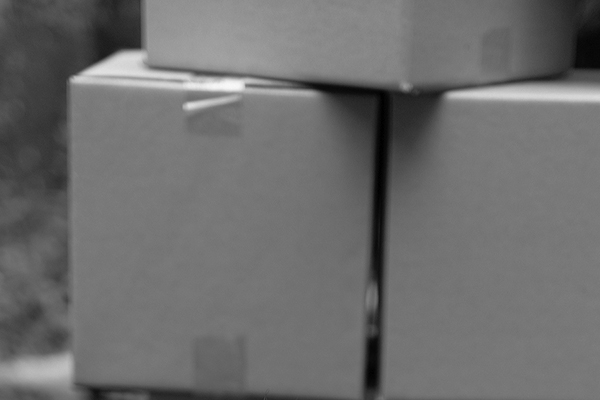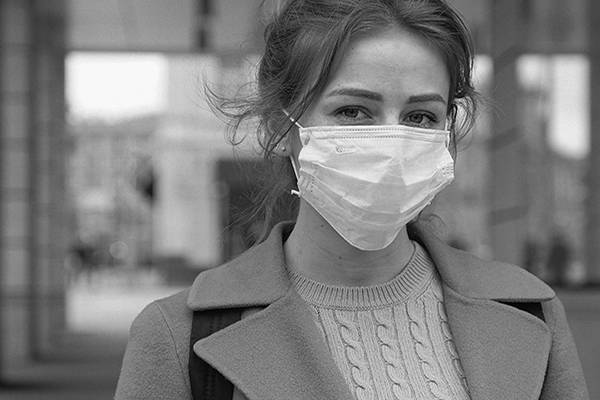by Kristen Glass Perez
This year, what I thought Lent would look like on Ash Wednesday, has radically changed. I serve as a college chaplain at one of the ELCA colleges. With the reality of the coronavirus (COVID-19) pandemic, it seems as if we are all in this period of adjusting to an evolving landscape that seems to shift by the hour.
Like many of you, my work and life have changed. In both higher education and the church, we have had to figure out what to do in the middle of great upheaval.
In that spirit, I would like to share with you a few of my reflections during this unprecedented time. They are filtered through my own life experience with the death of my husband.
Life changed instantly
 Javier died in August of 2017. He was 42 years old. It was sudden and unexpected. I was visiting France when he died, preparing to lead a student trip there the following year. The last conversation Javier and I had was an international phone call about ordering from Amazon. At the time, I didn’t know it would be our last conversation. As you might imagine, life as I knew it changed instantly. When I arrived home, exhausted, devastated and jet-lagged to plan for his funeral, the items he ordered for us were waiting. It was the welcome home I never wanted, but also one that I clung to; a glimpse of normal life that was gone forever.
Javier died in August of 2017. He was 42 years old. It was sudden and unexpected. I was visiting France when he died, preparing to lead a student trip there the following year. The last conversation Javier and I had was an international phone call about ordering from Amazon. At the time, I didn’t know it would be our last conversation. As you might imagine, life as I knew it changed instantly. When I arrived home, exhausted, devastated and jet-lagged to plan for his funeral, the items he ordered for us were waiting. It was the welcome home I never wanted, but also one that I clung to; a glimpse of normal life that was gone forever.
The academic year started two weeks after his funeral. I went back to work—because that’s what I needed to do—for very tangible reasons and also because it is what I needed to do. I had no idea what I was going to do. How was I going to make it through my role as one who does public proclamation and tends to the life issues of young adults?
All I could do, was what I knew how to do. I sat with my student leadership team and with tears streaming down my face I said, “I don’t know how to be your pastor without showing you how sad I am; so just know that it is ok to talk about Javier and to say his name and that you are going to help me figure this out.”
I also wept while leading worship. And, you know what? Nobody cared. I don’t mean that in a callous way—but nobody expected me to act as if nothing had happened. That’s what I was worried about. How do I pretend that nothing has happened? It turns out, you can’t act as if nothing has happened. It’s impossible.
The familiar process of grief
 Recently, the Harvard Business Review published an article describing the collective experience of the coronavirus as grief. It resonated deeply with me and I found myself sharing it widely with others. I realized why the COVID-19 crisis felt familiar to me. Even though the circumstances are different, the process feels like the grief process.
Recently, the Harvard Business Review published an article describing the collective experience of the coronavirus as grief. It resonated deeply with me and I found myself sharing it widely with others. I realized why the COVID-19 crisis felt familiar to me. Even though the circumstances are different, the process feels like the grief process.
I have felt tired, confused, disoriented and angry. I have felt sad and disbelieving. I have wondered about strange things that I think maybe shouldn’t matter. This is the grief process and it cannot be skipped or avoided. It is not enough to move our regular routines online and pretend as if nothing has happened. It doesn’t work that way.
My own experience with grief has taught me, that in a time of complete upheaval, the only way through it is through it. That means you can’t go around it, and you can’t avoid it. It also means you must name it.
I have also learned that I will never be “over” it. It has changed who I am. I learned that to live out my daily life as Pastor Kristen, college chaplain, was to not pretend as if life was the same. It wasn’t. It isn’t. It will never be the same again. Two and a half years later, I don’t always weep during the regular rhythms of my life and work anymore—but sometimes I do.
In her book, “It’s Ok that You’re Not Ok,” Megan Devine writes: “Some things cannot be fixed; they can only be carried.” We will not be the same after our experience with the coronavirus. There are some things that will not ever return to the way that they were. In order to process that, we can’t simply zoom into a new way of life without naming our collective grief.
I also know that the secondary losses that come with any sort of loss are very real. Secondary losses are those things that have gone away as a result of the primary loss. In the same way that I grieve every day for the loss of the potential for Javier’s life and my life, I also grieve for all of the lost opportunities in the world right now. Like many people, I feel devastated by the very real physical, social and emotional toll the coronavirus will cause including the loss of human life.
I also feel sadness for the class of 2020 and all of the students and teachers who won’t be able to accomplish what they need to; the lost performances, athletic competitions, ceremonies and celebrations.
I find myself, again, wondering if other people are wondering if they are supposed to act like nothing is different or we all know what to do. I want to be able to say out loud that nobody knows what to do and some things cannot be fixed—they can only be carried. That’s what we are doing.
A few other things I have learned about grief:
 I have learned that I am hyper-sensitive about the danger of a single story as so beautifully described by Chimamanda Adichie in her TedTalk. I never want the single story of Javier’s life to be his death; nor do I want it to be the single story of my life. Instead, there are many other things I wish for people to know and remember about him. I sometimes say that his death was the least important part of his life and yet on that day, my life rebooted.
I have learned that I am hyper-sensitive about the danger of a single story as so beautifully described by Chimamanda Adichie in her TedTalk. I never want the single story of Javier’s life to be his death; nor do I want it to be the single story of my life. Instead, there are many other things I wish for people to know and remember about him. I sometimes say that his death was the least important part of his life and yet on that day, my life rebooted.
And so—it’s still a part of the story. The single-story of the class of 2020 won’t be the novel coronavirus but it also will not, not be a part of their story. The single-story of our communities will not be this illness—but it and our response to it, certainly will become a part of our evolving story.
I have learned that we don’t have to make good from bad. We don’t need tragedy to become better versions of ourselves; better physicians, better professors, better poets, better planners, better pastors, better people. It is not enough to look for the “why of God” in these times of tragedy. Instead, we look for the “who of God” in Jesus who accompanies us, weeps with us, worships with us and searches with us. And yet—goodness and betterness will emerge. In the midst of tragedy, God is present and love is still revealed.
 This was highlighted for me recently as I sorted through items donated to the on-campus food pantry at the college where I serve as pastor. I found handwritten notes on several packages of ramen noodles from students left for other students that said, “you are not alone.” Those notes are like the spring bulbs that insist on popping up in my yard—bright spots of yellow and purple—in and through the pandemic. Those notes remind me when I need to be reminded- that relationship trumps doctrine—at every level. Those notes remind me that even though this wasn’t what I planned for Lent to look like, Easter will still come. Those notes are insistent reminders of resurrection. During this time, we will rely on people to carry us—maybe those we never imagined. The package delivery worker who once reminded me only of death, now reminds me of hope. It’s not what I expected, but it’s what is happening now. In a situation that we didn’t choose, may we find ways to continue to carry one another during this time.
This was highlighted for me recently as I sorted through items donated to the on-campus food pantry at the college where I serve as pastor. I found handwritten notes on several packages of ramen noodles from students left for other students that said, “you are not alone.” Those notes are like the spring bulbs that insist on popping up in my yard—bright spots of yellow and purple—in and through the pandemic. Those notes remind me when I need to be reminded- that relationship trumps doctrine—at every level. Those notes remind me that even though this wasn’t what I planned for Lent to look like, Easter will still come. Those notes are insistent reminders of resurrection. During this time, we will rely on people to carry us—maybe those we never imagined. The package delivery worker who once reminded me only of death, now reminds me of hope. It’s not what I expected, but it’s what is happening now. In a situation that we didn’t choose, may we find ways to continue to carry one another during this time.
Closing prayer:
Loving God, thank you for all of the reminders of your persistent love in a world that desperately needs it. In times of upheaval and uncertainty, help us to be present in our lives and our communities as they really are, not only as we wish they were. In a time when we must be physically distant, help us to see and respond to the needs of others even as we see and respond to our own needs. Amen.
Reflection questions:
1. When did the coronavirus crisis become real for you?
2. What is a secondary loss that you are grieving?
3. Where have you seen signs of resurrection in the world during the crisis?
 The Rev. Kristen Glass Perez serves as College Chaplain at Muhlenberg College in Allentown, Pa. Egner Chapel at Muhlenberg College is the home of the first WELCA Campus Unit.
The Rev. Kristen Glass Perez serves as College Chaplain at Muhlenberg College in Allentown, Pa. Egner Chapel at Muhlenberg College is the home of the first WELCA Campus Unit.


You speak of secondary losses. Father in law passed away, his wife who had always wanted to host all the Christmas gatherings suddenly didn’t want to do it anymore. For years she had insisted we all come to her house, our houses were too small she said. It was a result we had never dreamed of. We were already sad and then our Christmas tradition has to change also. Her grown children, her college age grandchildren, cousins and uncles all disappointed on top of being sad. It was so hard to get used to. It has been 14 years. We have moved on but it still doesn’t feel right.
This helped me so much to begin to process the many mixed emotions I have been experiencing – guilt mixed with annoyance at the many little inconveniences, fear mixed with hope and trust & trust for a tomorrow, gratefulness for all I have mixed with sorrow for all that is gone forever…. Thank you for expressing some of the things I have been unwilling to admit to myself, let alone others.
Pastor Perez was able to say so many of the things that I am thinking now too. Thank you. Things will never be the same. Time to reboot. I have recently lost a dear friend rather unexpectedly and am in a state of grieving the fact that she is no longer a part of my present day life. Memories are so precious. This pandemic affects us all, and we wonder how we are being changed by it for our new lives afterwards. Will there be more kindness and generosity? Will our values return to better, simpler ones? Yes, it is okay to grieve, but not without hope. We are assured that the Lord is with us in this, and good days are coming. In the meantime we look for the good still present in our lives even as we move through this. God is good.
Thank you so much. I live alone, having lost my husband of 36 years to leukemia in 2015. I watch the families and couples walk the beach together and feel such a sense of loss of my best friend. We would have been such a comfort to each other during this time of isolation. I especially miss human hugs and touch.
Thank you for your bravery and clear writing. It is so important to hear from faith leaders struggling through this together at this time.
Thank you for helping us put a face to the feelings we are all experiencing . In these times we need every ounce of faith to manage and push forward
Dear Kristen
What courage you show and everything I read I felt that way too.
My story is also so and I still cry.
In 1969 I married my love, after 11 days he was killed in a car accident. Plus a good friend who was only 18. My husband was 20.
My mom died from suicide in 1985.
I have had many death, but who doesn’t at my age.
I had to give up my dag, because I couldn’t take care of her anymore. I am waiting to have a big back surgery and in pain most of the time.
Giving up my dog was hard, but she went to where we always boarded her and after I e-mailed them about her they e-mailed back, “Can we please have Lily, we love her.” They never put her in a kennel, but kept her in their office. We had so much stress that she was picking it up and now she looks so happy from the pictures I got from them.
Thank you for writing such a wonderful article. I touched my heart. So lose your husband at 42 had to be very hard. Remember they are always looking down on us and are always in our hearts.
Blessings and Safety during this trail.
Thank you, Kristen, for your honest sharing. Your piece is helpful. I also found this article helpful, on why it is okay to grieve. https://www.npr.org/sections/health-shots/2020/03/26/820304899/coronavirus-has-upended-our-world-its-ok-to-grieve?utm_source=facebook.com&utm_campaign=npr&utm_term=nprnews&utm_medium=social&fbclid=IwAR0NXQwXc3GNyVyRqOwwoNnHDS2pYST4ih1sMT4UziNBx2rBV32-99L4el8
Thank you Kristen.
Thank you.
Kristen, I remember you from Advent. You had come to visit in your capacity as a chaplain and I came to understand at that time you had been widowed. I wondered at that time. Thank you for not only sharing your story but your wonderfully insightful experience with grief. I’m glad you heard God’s call. Blessings to you
You put my grief, longing, and loneliness into words. My husband, (we married late in life and had only seven years together) died close to two years ago. I’m still finding it difficult not to be stopped short in the middle of … anything ,,, missing him and longing for him. I don’t question God’s plan, but I do question why I can’t understand it. I lean on Job 38 and that helps, some. Peace be with you going forward.